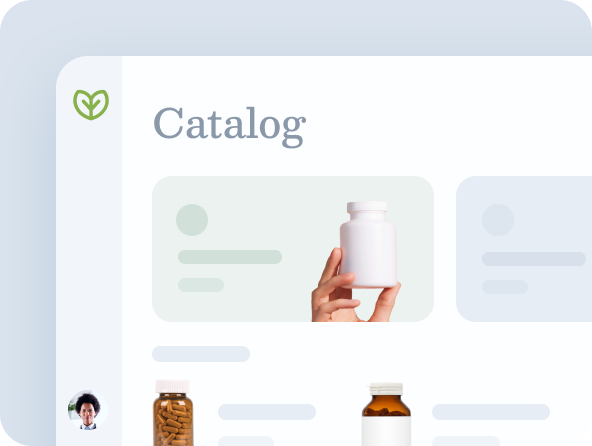Throughout adulthood, women experience unique health concerns, such as pregnancy and menopause, which we can support with integrative therapies. Among Fullscript’s many resources available to practitioners, Fullscript protocols outline evidence-based therapies for various health concerns. These protocols, which serve as a foundation for building patient treatment plans, are based on high-quality evidence and clinical expertise.
This article specifically highlights our women’s health protocols, including the best women’s health supplements according to their particular health needs.
Supplementation around pregnancy, for example, can help decrease the risk of adverse pregnancy outcomes and support the health of both mom and baby. (26)(34)(51) For those struggling with infertility, supplements may help optimize the chances of conception and a successful pregnancy. (10)(14)(40) Nutraceuticals may also help address hormonal dysfunction contributing to polycystic ovary syndrome (PCOS) (42) or relieve symptoms of menopause. (2)(48) These protocols serve as a great starting point when determining which interventions and women’s health supplements are best for your patients.
4 Fullscript protocols for women’s health
This article summarizes our women’s health protocols, who they’re for, the key ingredients, and how they can address patient needs.
1. Fertility support
The ingredients included in this protocol have demonstrated improved outcomes in women looking to conceive naturally, those using assisted reproductive technologies (ART), and those with underlying hormonal dysfunction, such as in PCOS. Ingredients featured in this protocol include myo-inositol, vitamin D, prenatal vitamins, N-acetylcysteine (NAC), and ashwagandha (Withania somnifera).
Myo-inositol
Supplementation with myo-inositol has demonstrated improved reproductive parameters with the use of reproductive technologies such as intracytoplasmic sperm injection (ICSI), (10) follicular stimulation, and in-vitro fertilization (IVF). (10)
In those with PCOS, myo-inositol may improve ovulation rates, (42) sensitivity to clomiphene citrate (CC), and pregnancy rates in those who utilized CC (45) or intrauterine insemination (IUI). (40)
Vitamin D
Vitamin D repletion has been associated with increased pregnancy and live birth rates in individuals undergoing ART (14) and an improvement in reproductive parameters such as anti-mullerian hormone (AMH) in women without PCOS. (36)
Prenatal multivitamins
Prenatal multivitamins taken prior to conception or ovulation induction have been shown to improve fertility by increasing pregnancy rates, decreasing the number of pregnancy attempts required, (3)(17) and decreasing the risk of adverse pregnancy outcomes, such as neural tube defects. (17) A similar benefit has been documented in those undergoing IVF with improved pregnancy and live birth rates. (7)
N-acetyl cysteine (NAC)
In patients with PCOS, NAC administered adjunctively with CC can lead to improved ovulation, endometrial thickness, (47) pregnancy, and live birth rates. (32)(37)(38) This NAC and CC combination has been shown to be more effective compared to metformin with CC. (32) NAC also has the potential to decrease the risk of pregnancy loss. (37)
Ashwagandha (Withania somnifera)
Ashwagandha may improve sexual function in females, with documented improvements in arousal, lubrication, orgasm, satisfaction, (19) the number of sexual encounters, (19) and sexual behavior. (9)
2. Ovarian wellness
This protocol aims to promote optimal ovarian function by addressing endocrine disorders such as PCOS which may cause reproductive dysfunction. PCOS presents with significant metabolic factors such as insulin resistance and oxidative stress. As a result, PCOS interventions may also benefit common comorbidities with PCOS, such as obesity, type 2 diabetes, and metabolic syndrome. (23) Key ingredients highlighted in this protocol include inositol, omega-3 with vitamin E, vitamin D, berberine, and chromium picolinate.
Inositol
In patients with PCOS, inositol (myo-inositol and d-chiro-inositol) supplementation may improve insulin sensitivity, (11) ovarian function (1) and symptoms of hyperandrogenism. (1) Myo-inositol combined with d-chiro-inositol has demonstrated improved outcomes for IVF and embryo transfer (IVF-ET), including improved quality of oocytes and embryos as well as pregnancy rates. (16)
Omega-3 fatty acids and vitamin E
Supplementation with omega-3 fatty acids and vitamin E may improve insulin resistance, (52) antioxidant capacity, (46) lipid profile, (43) and decrease androgen levels which are often elevated in individuals with PCOS. (20)
Vitamin D
In patients with PCOS, vitamin D supplementation may improve insulin sensitivity, (18) follicular development, (21) antioxidant capacity, C-reactive protein (CRP), total testosterone, and sex hormone-binding globulin (SHBG). (28) Metformin combined with vitamin D may help to further regulate the menstrual cycle than vitamin D alone. (21)
Berberine
In patients with PCOS, berberine was shown to decrease total testosterone, free androgen index, fasting glucose, fasting insulin, HOMA-IR, (5) high sensitivity CRP (hs-CRP), (5) and increase SHBG. (5) In those undergoing IVF, berberine improved total FSH requirement and live birth rate. (5) Berberine has also been shown to benefit the lipid profile in those with and without PCOS who have hypercholestermia. (15)
Chromium picolinate
Chromium picolinate may improve cholesterol, glycemic control, (27) oxidative stress, body mass index (BMI), (22) antioxidant capacity and decreased hirsutism and serum CRP levels. (28) Additionally, chromium picolinate is associated with improved reproductive outcomes including reduced testosterone, (22) increased chance of ovulation, menstrual cycle regulation, (8) and improved pregnancy rates. (28)

3. Pregnancy support
This protocol includes ingredients to support the increased nutritional demands during pregnancy, relieve symptoms associated with pregnancy, and minimize the risk of adverse outcomes. Featured formulations and ingredients include prenatal multivitamins, omega-3 fatty acids, ginger, calcium, and magnesium.
Prenatal multivitamins
A prenatal multivitamin taken during the preconception period may decrease the risk of small gestational age, neural tube defects, cardiovascular defects, urinary tract defects, and limb deficiencies. (51) Apart from neural tube defects, folic acid, typically included in prenatal formulations, may improve intellectual development and reduce the risk of autism traits, attention-deficit/hyperactivity disorder (ADHD), and behavioral and language problems. (12) Vitamin B12 supplementation may also decrease the risk of neural tube defects, (35) whereas vitamin D may help decrease the risk of having a baby with low birth weight. (6)
For pregnant individuals, vitamin B6 supplementation may help relieve pregnancy-induced nausea and vomiting. (31) In addition, iodine may reduce the risk of developing postpartum hyperthyroidism, (24) iron may reduce the risk of maternal anemia or iron deficiency, (41) and vitamin D reduces the risk of pre-eclampsia, gestational diabetes, and severe postpartum hemorrhage. (6)
Omega-3 fatty acids
Omega-3 supplementation may reduce the risk for preterm birth and low birth weight (34) and improve infant cognitive development. (39)
Ginger (Zingiber officinale)
Ginger has been shown to be as effective as vitamin B6 for nausea and vomiting when taken during the first two months of pregnancy. After two months, vitamin B6 appears to be more effective. (31)
Calcium
Calcium is associated with a decreased risk of pre-eclampsia, (44) maternal death, and/or serious morbidity. (26) As a result, increased calcium intake is recommended for those with a low dietary intake of this nutrient.
Magnesium
Magnesium supplementation is associated with better health outcomes for the mother and baby including higher Apgar scores in newborns and a decreased likelihood of the mother requiring hospitalization. (33)
Did you know? Although many prenatal vitamins include some calcium and magnesium, it’s often not enough to meet nutritional needs during pregnancy.

4. Hot flashes
This protocol highlights the best supplements for individuals who may be experiencing hot flashes related to menopause. Several nutraceuticals have demonstrated beneficial effects in relieving hot flashes. Some of these are phytoestrogens, which can help to modulate symptoms and estrogen levels during this time of low estrogen. Therapies outlined in this protocol include isoflavones, St. John’s wort, black cohosh, rhubarb extract (ERr 731) and vitamin E.
Isoflavones
Isoflavones have been found to reduce the frequency and severity of hot flashes (49) and night sweats. (13)
St. John’s wort (Hypericum perforatum)
St. John’s wort has also been shown to decrease the duration, frequency, and severity of hot flashes. (2) Intake of this herb was also associated with better quality of life. (4)
Black cohosh (Actaea racemosa)
Black cohosh has been shown to reduce hot flashes and night sweats. (48) In a clinical trial, black cohosh supplementation was associated with the lowest incidence of breast tenderness and vaginal bleeding when compared to other treatment groups using estradiol valerate and progesterone or estradiol valerate and medroxyprogesterone acetate. (53)
Rhubarb extract (ERr 731)
ERr 731 has also been shown to decrease the number and severity of hot flashes (30) with no adverse effects. It has also been associated with increased menopause-specific quality of life. (25)
Vitamin E
Supplementation with vitamin E may also reduce the severity and frequency of hot flashes. (54)
The bottom line
Many of the health concerns women experience can be supported with natural ingredients, which can make a great addition to conventional care. Whether it’s to address fertility, PCOS, pregnancy, or menopause, an integrative approach can help deliver the best care possible. Our evidence-based protocols highlight several therapeutic options to consider when exploring the best women’s health supplements and treatment options for your patients.
Before prescribing new supplements, always collect a complete history from your patients to ensure that the herbs and other supplements you’re recommending do not interfere with any medications they’re currently taking. For more information regarding drug-nutrient interactions, visit the Fullscript blog.
Ready to start delivering better patient care?

- A, P., Laganà, A. S., & Barbaro, L. (2014). Comparison between effects of myo-inositol andd-chiro-inositol on ovarian function and metabolic factors in women with PCOS. Gynecological Endocrinology, 30(3), 205–208. https://doi.org/10.3109/09513590.2013.860120
- Abdali, K., Khajehei, M., & Tabatabaee, H. R. (2010). Effect of St John’s wort on severity, frequency, and duration of hot flashes in premenopausal, perimenopausal and postmenopausal women. Menopause, 17(2), 326–331. https://doi.org/10.1097/gme.0b013e3181b8e02d
- Agrawal, R., Burt, E., Gallagher, A. M., Butler, L., Venkatakrishnan, R., & Peitsidis, P. (2012). Prospective randomized trial of multiple micronutrients in subfertile women undergoing ovulation induction: a pilot study. Reproductive Biomedicine Online, 24(1), 54–60. https://doi.org/10.1016/j.rbmo.2011.10.004
- Al-Akoum, M., Maunsell, E., Verreault, R., Provencher, L., Otis, H., & Dodin, S. (2009). Effects of Hypericum perforatum (St. John’s wort) on hot flashes and quality of life in perimenopausal women. Menopause, 16(2), 307–314. https://doi.org/10.1097/gme.0b013e31818572a0
- An, Y., Sun, Z., Zhang, Y., Liu, B., Guan, Y., & Lu, M. (2014). The use of berberine for women with polycystic ovary syndrome undergoing IVF treatment. Clinical Endocrinology, 80(3), 425–431. https://doi.org/10.1111/cen.12294
- Ansary, A., Palacios, C., De-Regil, L. M., & Peña-Rosas, J. P. (2010). Vitamin D supplementation for women during pregnancy. Cochrane Database of Systematic Reviews. https://doi.org/10.1002/14651858.cd008873
- Arhin, S. K., Zhao, Y., Lu, X., Chetry, M., & Lu, J. (2017). Effect of micronutrient supplementation on IVF outcomes: a systematic review of the literature. Reproductive Biomedicine Online, 35(6), 715–722. https://doi.org/10.1016/j.rbmo.2017.08.018
- Ashoush, S., Abou-Gamrah, A., Bayoumy, H. A., & Othman, N. A. (2016). Chromium picolinate reduces insulin resistance in polycystic ovary syndrome: Randomized controlled trial. Journal of Obstetrics and Gynaecology Research, 42(3), 279–285. https://doi.org/10.1111/jog.12907
- Azgomi, R. N. D., Zomorrodi, A., Nazemyieh, H., Fazljou, S. M. B., Sadeghi-Bazargani, H., Nejatbakhsh, F., Jazani, A. M., & Asrbadr, Y. A. (2018). Effects ofWithania somniferaon Reproductive System: A Systematic Review of the Available Evidence. BioMed Research International, 2018, 1–17. https://doi.org/10.1155/2018/4076430
- Caprio, F., D’Eufemia, M. D., Trotta, C., Campitiello, M. R., Ianniello, R., Mele, D., & Colacurci, N. (2015). Myo-inositol therapy for poor-responders during IVF: a prospective controlled observational trial. Journal of Ovarian Research. https://doi.org/10.1186/s13048-015-0167-x
- Cheang, K. I., Baillargeon, J., Essah, P. A., Ostlund, R. E., Apridonize, T., Islam, L. Z., & Nestler, J. E. (2008). Insulin-stimulated release of d-chiro-inositol–containing inositolphosphoglycan mediator correlates with insulin sensitivity in women with polycystic ovary syndrome. Metabolism-clinical and Experimental, 57(10), 1390–1397. https://doi.org/10.1016/j.metabol.2008.05.008
- Chen, R., Fan, L., Gao, R., Jin, X., Cheng, K., Zhang, S., Hu, X., Xu, W., & Wang, H. (2021). Neurodevelopmental effects of maternal folic acid supplementation: a systematic review and meta-analysis. Critical Reviews in Food Science and Nutrition, 1–17. https://doi.org/10.1080/10408398.2021.1993781
- Cheng, G., Wilczek, B., Warner, M., Gustafsson, J., & Landgren, B. M. (2007). Isoflavone treatment for acute menopausal symptoms. Menopause, 14(3), 468–473. https://doi.org/10.1097/gme.0b013e31802cc7d0
- Chu, J. J. H., Gallos, I. D., Tobias, A., Tan, B. K., Eapen, A., & Coomarasamy, A. (2018). Vitamin D and assisted reproductive treatment outcome: a systematic review and meta-analysis. Human Reproduction, 33(1), 65–80. https://doi.org/10.1093/humrep/dex326
- Cicero, A. F. G., Reggi, A., Parini, A., Morbini, M., Rosticci, M., Grandi, E., & Borghi, C. (2014). Berberine and Monacolin Effects on the Cardiovascular Risk Profile of Women with Oestroprogestin-Induced Hypercholesterolemia. High Blood Pressure & Cardiovascular Prevention, 21(3), 221–226. https://doi.org/10.1007/s40292-014-0052-5
- Colazingari, S., Treglia, M., Najjar, R., & Bevilacqua, A. (2013). The combined therapy myo-inositol plus d-chiro-inositol, rather than d-chiro-inositol, is able to improve IVF outcomes: results from a randomized controlled trial. Archives of Gynecology and Obstetrics, 288(6), 1405–1411. https://doi.org/10.1007/s00404-013-2855-3
- Czeizel, A. E., Dudás, I., & Métneki, J. (1994). Pregnancy outcomes in a randomised controlled trial of periconceptional multivitamin supplementation. Archives of Gynecology and Obstetrics, 255(3), 131–139. https://doi.org/10.1007/bf02390940
- Dastorani, M., Aghadavod, E., Mirhosseini, N., Foroozanfard, F., Modarres, S. Z., Siavashani, M. A., & Asemi, Z. (2018). The effects of vitamin D supplementation on metabolic profiles and gene expression of insulin and lipid metabolism in infertile polycystic ovary syndrome candidates for in vitro fertilization. Reproductive Biology and Endocrinology, 16(1). https://doi.org/10.1186/s12958-018-0413-3
- Dongre, S., Langade, D., & Bhattacharyya, S. (2015). Efficacy and Safety of Ashwagandha (Withania somnifera) Root Extract in Improving Sexual Function in Women: A Pilot Study. BioMed Research International, 2015, 1–9. https://doi.org/10.1155/2015/284154
- Ebrahimi, F. A., Samimi, M., Foroozanfard, F., Jamilian, M., Akbari, H., Rahmani, E., Ahmadi, S., Taghizadeh, M., Memarzadeh, M. R., & Asemi, Z. (2017). The Effects of Omega-3 Fatty Acids and Vitamin E Co-Supplementation on Indices of Insulin Resistance and Hormonal Parameters in Patients with Polycystic Ovary Syndrome: A Randomized, Double-Blind, Placebo-Controlled Trial. Experimental and Clinical Endocrinology & Diabetes, 125(06), 353–359. https://doi.org/10.1055/s-0042-117773
- Fang, F., Ni, K., Cai, Y., Lin, K. A., & Zhang, X. (2017). Effect of vitamin D supplementation on polycystic ovary syndrome: A systematic review and meta-analysis of randomized controlled trials. Complementary Therapies in Clinical Practice, 26, 53–60. https://doi.org/10.1016/j.ctcp.2016.11.008
- Fazelian, S., Rouhani, M. H., Bank, S. S., & Amani, R. (2017). Chromium supplementation and polycystic ovary syndrome: A systematic review and meta-analysis. Journal of Trace Elements in Medicine and Biology, 42, 92–96. https://doi.org/10.1016/j.jtemb.2017.04.008
- Gilbert, E. W., Tay, C. T., Hiam, D., Teede, H. J., & Moran, L. J. (2018). Comorbidities and complications of polycystic ovary syndrome: An overview of systematic reviews. Clinical Endocrinology, 89(6), 683–699. https://doi.org/10.1111/cen.13828
- Harding, K. B., Peña-Rosas, J. P., Webster, A. C., Yap, C. M., Payne, B. K., Ota, E., & De-Regil, L. M. (2017). Iodine supplementation for women during the preconception, pregnancy and postpartum period. The Cochrane Library, 2017(3). https://doi.org/10.1002/14651858.cd011761.pub2
- Heger, M., Ventskovskiy, B. M., Borzenko, I. B., Kneis, K. C., Rettenberger, R., Kaszkin-Bettag, M., & Heger, P. (2006). Efficacy and safety of a special extract of Rheum rhaponticum (ERr 731) in perimenopausal women with climacteric complaints. Menopause, 13(5), 744–759. https://doi.org/10.1097/01.gme.0000240632.08182.e4
- Hofmeyr, G. J., Lawrie, T. A., Atallah, Á. N., & Torloni, M. R. (2018). Calcium supplementation during pregnancy for preventing hypertensive disorders and related problems. The Cochrane Library, 2018(10). https://doi.org/10.1002/14651858.cd001059.pub5
- Jamilian, M., Bahmani, F., Siavashani, M. A., Mazloomi, M., Asemi, Z., & Esmaillzadeh, A. (2016). The Effects of Chromium Supplementation on Endocrine Profiles, Biomarkers of Inflammation, and Oxidative Stress in Women with Polycystic Ovary Syndrome: a Randomized, Double-Blind, Placebo-Controlled Trial. Biological Trace Element Research, 172(1), 72–78. https://doi.org/10.1007/s12011-015-0570-6
- Jamilian, M., Foroozanfard, F., Rahmani, E., Talebi, M., Bahmani, F., & Asemi, Z. (2017). Effect of Two Different Doses of Vitamin D Supplementation on Metabolic Profiles of Insulin-Resistant Patients with Polycystic Ovary Syndrome. Nutrients, 9(12), 1280. https://doi.org/10.3390/nu9121280
- Jamilian, M., Modarres, S. Z., Siavashani, M. A., Karimi, M., Mafi, A., Ostadmohammadi, V., & Asemi, Z. (2018). The Influences of Chromium Supplementation on Glycemic Control, Markers of Cardio-Metabolic Risk, and Oxidative Stress in Infertile Polycystic ovary Syndrome Women Candidate for In vitro Fertilization: a Randomized, Double-Blind, Placebo-Controlled Trial. Biological Trace Element Research, 185(1), 48–55. https://doi.org/10.1007/s12011-017-1236-3
- Kaszkin-Bettag, M., Ventskovskiy, B. M., Solskyy, S., Beck, S., Hasper, I., Kravchenko, A. G., Rettenberger, R., Richardson, A., & Heger, P. (2009). Confirmation of the efficacy of ERr 731 in perimenopausal women with menopausal symptoms. PubMed, 15(1), 24–34. https://pubmed.ncbi.nlm.nih.gov/19161045
- Khorasani, F., Aryan, H., Sobhi, A., Aryan, R., Abavi-Sani, A., Ghazanfarpour, M., Saeidi, M., & Dizavandi, F. R. (2020). A systematic review of the efficacy of alternative medicine in the treatment of nausea and vomiting of pregnancy. Journal of Obstetrics and Gynaecology, 40(1), 10–19. https://doi.org/10.1080/01443615.2019.1587392
- Maged, A. M., Elsawah, H., Abdelhafez, A., Bakry, A., & Mostafa, W. A. (2015). The adjuvant effect of metformin andN-acetylcysteine to clomiphene citrate in induction of ovulation in patients withPolycystic Ovary Syndrome. Gynecological Endocrinology, 31(8), 635–638. https://doi.org/10.3109/09513590.2015.1037269
- Makrides, M., Crosby, D. D., Shepherd, E., & Crowther, C. A. (2014). Magnesium supplementation in pregnancy. The Cochrane Library, 2019(5). https://doi.org/10.1002/14651858.cd000937.pub2
- Middleton, P., Gomersall, J. S., Gould, J. F., Shepherd, E., Olsen, S. F., & Makrides, M. (2018). Omega-3 fatty acid addition during pregnancy. The Cochrane Library, 2018(11). https://doi.org/10.1002/14651858.cd003402.pub3
- Molloy, A. M., Kirke, P. N., Troendle, J., Burke, H., Sutton, M., Brody, L. C., Scott, J. D., & Mills, J. L. (2009). Maternal Vitamin B12 Status and Risk of Neural Tube Defects in a Population With High Neural Tube Defect Prevalence and No Folic Acid Fortification. Pediatrics, 123(3), 917–923. https://doi.org/10.1542/peds.2008-1173
- Moridi, I., Chen, A. P., Tal, O., & Tal, R. (2020). The Association between Vitamin D and Anti-Müllerian Hormone: A Systematic Review and Meta-Analysis. Nutrients, 12(6), 1567. https://doi.org/10.3390/nu12061567
- Nasr, A. (2010). Effect of N-acetyl-cysteine after ovarian drilling in clomiphene citrate-resistant PCOS women: a pilot study. Reproductive Biomedicine Online, 20(3), 403–409. https://doi.org/10.1016/j.rbmo.2009.12.012
- Nemati, M., Nemati, S., Taheri, A. M., & Heidari, B. (2017). Comparison of metformin and N-acetyl cysteine, as an adjuvant to clomiphene citrate, in clomiphene-resistant women with polycystic ovary syndrome. Journal of Gynecology Obstetrics and Human Reproduction, 46(7), 579–585. https://doi.org/10.1016/j.jogoh.2017.07.004
- Nevins, J. E., Donovan, S. M., Snetselaar, L., Dewey, K. G., Novotny, R., Stang, J., Taveras, E. M., Kleinman, R. E., Bailey, R. L., Raghavan, R., Scinto-Madonich, S., Venkatramanan, S., Butera, G., Terry, N., Altman, J., Adler, M., Obbagy, J., Stoody, E. E., & De Jesus, J. M. (2021). Omega-3 Fatty Acid Dietary Supplements Consumed During Pregnancy and Lactation and Child Neurodevelopment: A Systematic Review. Journal of Nutrition, 151(11), 3483–3494. https://doi.org/10.1093/jn/nxab238
- Özay, Ö. E., Özay, A. C., Cagliyan, E., Okyay, R. E., & Gülekli, B. (2017). Myo-inositol administration positively effects ovulation induction and intrauterine insemination in patients with polycystic ovary syndrome: a prospective, controlled, randomized trial. Gynecological Endocrinology, 33(7), 524–528. https://doi.org/10.1080/09513590.2017.1296127
- Peña-Rosas, J. P., De-Regil, L. M., García-Casal, M. N., & Dowswell, T. (2015). Daily oral iron supplementation during pregnancy. The Cochrane Library, 2015(7). https://doi.org/10.1002/14651858.cd004736.pub5
- Pundir, J., Psaroudakis, D., Savnur, P., Bhide, P., Sabatini, L., Teede, H. J., Coomarasamy, A., & Thangaratinam, S. (2018). Inositol treatment of anovulation in women with polycystic ovary syndrome: a meta-analysis of randomised trials. Bjog: An International Journal of Obstetrics and Gynaecology, 125(3), 299–308. https://doi.org/10.1111/1471-0528.14754
- Rahmani, E., Samimi, M., Ebrahimi, F. A., Foroozanfard, F., Ahmadi, S., Rahimi, M., Jamilian, M., Aghadavod, E., Bahmani, F., Taghizadeh, M., Memarzadeh, M. R., & Asemi, Z. (2017). The effects of omega-3 fatty acids and vitamin E co-supplementation on gene expression of lipoprotein(a) and oxidized low-density lipoprotein, lipid profiles and biomarkers of oxidative stress in patients with polycystic ovary syndrome. Molecular and Cellular Endocrinology, 439, 247–255. https://doi.org/10.1016/j.mce.2016.09.008
- Regitz-Zagrosek, V., Roos-Hesselink, J. W., Bauersachs, J., Blomström-Lundqvist, C., Cifkova, R., De Bonis, M., Iung, B., Johnson, M. H., Kintscher, U., Kranke, P., Lang, I. M., Morais, J., Pieper, P. G., Presbitero, P., Price, S., Rosano, G. M., Seeland, U., Simoncini, T., Swan, L., & Warnes, C. A. (2018). 2018 ESC Guidelines for the management of cardiovascular diseases during pregnancy. European Heart Journal, 39(34), 3165–3241. https://doi.org/10.1093/eurheartj/ehy340
- Rolland, A. L., Peigné, M., Plouvier, P., Dumont, A., Catteau-Jonard, S., & Dewailly, D. (2017). Could myo-inositol soft gel capsules outperform clomiphene in inducing ovulation? Results of a pilot study. PubMed, 21(2 Suppl), 10–14. https://pubmed.ncbi.nlm.nih.gov/28724178
- Sadeghi, F., Alavi-Naeini, A., Mardanian, F., Ghazvini, M. a. F., & Mahaki, B. (2020). Omega-3 and vitamin E co-supplementation can improve antioxidant markers in obese/overweight women with polycystic ovary syndrome. International Journal for Vitamin and Nutrition Research, 90(5–6), 477–483. https://doi.org/10.1024/0300-9831/a000588
- Salehpour, S., Sene, A. A., Saharkhiz, N., Sohrabi, M., & Moghimian, F. (2012). N-acetylcysteine as an adjuvant to clomiphene citrate for successful induction of ovulation in infertile patients with polycystic ovary syndrome. Journal of Obstetrics and Gynaecology Research, 38(9), 1182–1186. https://doi.org/10.1111/j.1447-0756.2012.01844.x
- Shams, T., Setia, M. S., Hemmings, R., McCusker, J., Sewitch, M. J., & Ciampi, A. (2010). Efficacy of black cohosh-containing preparations on menopausal symptoms: a meta-analysis. PubMed, 16(1), 36–44. https://pubmed.ncbi.nlm.nih.gov/20085176
- Taku, K., Melby, M. K., Kronenberg, F., Kurzer, M. S., & Messina, M. (2012). Extracted or synthesized soybean isoflavones reduce menopausal hot flash frequency and severity. Menopause, 19(7), 776–790. https://doi.org/10.1097/gme.0b013e3182410159
- Wei, W., Zhao, H., Wang, A., Sui, M., Liang, K., Deng, H., Ma, Y., Zhang, Y., Zhang, H., & Guan, Y. (2012). A clinical study on the short-term effect of berberine in comparison to metformin on the metabolic characteristics of women with polycystic ovary syndrome. European Journal of Endocrinology, 166(1), 99–105. https://doi.org/10.1530/eje-11-0616
- Wolf, H. T., Hegaard, H. K., Huusom, L. D., & Pinborg, A. (2017). Multivitamin use and adverse birth outcomes in high-income countries: a systematic review and meta-analysis. American Journal of Obstetrics and Gynecology, 217(4), 404.e1-404.e30. https://doi.org/10.1016/j.ajog.2017.03.029
- Yang, K., Zeng, L., Bao, T., & Ge, J. (2018). Effectiveness of Omega-3 fatty acid for polycystic ovary syndrome: a systematic review and meta-analysis. Reproductive Biology and Endocrinology, 16(1). https://doi.org/10.1186/s12958-018-0346-x
- Zheng, T., Sun, A., Xue, W., Wang, Y., Jiang, Y., Zhang, Y., & Lang, J. (2013). Efficacy and safety of Cimicifuga foetida extract on menopausal syndrome in Chinese women. PubMed, 126(11), 2034–2038. https://pubmed.ncbi.nlm.nih.gov/23769553
- Ziaei, S., Kazemnejad, A., & Zareai, M. (2007). The Effect of Vitamin E on Hot Flashes in Menopausal Women. Gynecologic and Obstetric Investigation, 64(4), 204–207. https://doi.org/10.1159/000106491





